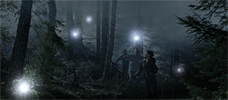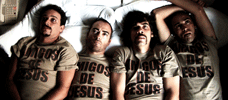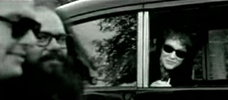Reviews
Caotica Ana
Julio Medem
Spain, 2007
Credits
Review by Tom Huddleston
Posted on 08 November 2007
Source 35mm print
Categories The Times BFI 51st London Film Festival
As a film critic, one is expected to remain objective at all times: to avoid, as much as possible, throwing one’s own personal prejudices, opinions, likes and dislikes into a review, but endeavouring to judge each individual film on its own merits. But every so often a film comes along which a reviewer loves, or loathes, for very personal reasons. Julio Medem’s new film Chaotic Ana is such a film for me, pushing so many personal buttons that it becomes impossible to write a clearheaded, objective review. There may be, indeed there will be some viewers who find this film charming, moving, possibly even life altering. For me it was an agonising, infuriating experience, one of the most dreadful, shallow, cringe-inducing works of pseudo-art it has ever been my misfortune to endure.
The film was made with the best of intentions. Six years ago, Medem’s sister Ana, an artist, was killed in a car crash en route to her first public exhibition. Chaotic Ana is constructed as a tribute to her, not as a portrayal of her life but as a summation of her character, her personality. This already makes the film more difficult to review: one feels loath to criticise the central character for fear of inadvertently speaking ill of the dead. Medem introduced the film at the screening I attended, and spoke very cogently and movingly about his sister’s death, and her reincarnation as the title character of this film. He also urged us to watch the film ‘with our brains switched off,’ eschewing reason in favour of a pure emotional response. It was here that the first alarm bells began to ring.
The story centres around the eponymous young female artist, who grows up on the island of Ibiza in a cave with her father, spending her time painting, swimming naked and taking pills at nightclubs. But when a mysterious benefactor appears and offers to spirit Ana away to her artists’ community in Madrid, her life changes completely. There she meets Saharan refugee Said, and they embark on a passionate affair, which is cut short when Said disappears suddenly (the reasons behind this are simply too daft to go into detail on). Around this time Ana also discovers that she has the ability to experience past lives through hypnotism, and although the experience is traumatic she agrees to undergo extensive sessions, each of which is filmed by fellow artist and best friend Linda.
Here things start to get weird(er). Ana’s father dies, probably, leading her to stow away on Linda’s father’s boat bound for New York. Here she inexplicably runs into her erstwhile hypnotherapist, who takes her down to New Mexico to speak to - surprise! - a Native American mystic woman. Then she takes a job in a pancake house, before Said returns and then leaves again for no good reason, and Ana ends up working in a restaurant, where she meets an American politician partly responsible for the Iraq war, and takes a shit on his face. Honestly.
But in the end, despite the above two paragraphs, summarising Chaotic Ana is sort of pointless. Plot is an irrelevance here, the first element of this film seemingly designed especially to frustrate this particular audience member. It deals with higher mystical and artistic realms, or at least it thinks it does: button number two. It focuses on a gorgeous, gregarious girl who seems to live a charmed life surrounded by exclusively beautiful people, but who still finds time to confront her deep seated inner pain: button number three. She has dreadlocks and dances to bad house music: button number four. Everyone around her takes her, and themselves, and their art terribly seriously, despite the fact that it’s, without exception, completely awful: button number five. The script takes scattered, ill-considered and shallow potshots at easy political and sociological targets: button number six. The entire film is mired in crass, half-baked spiritual mumbo jumbo, designed to appeal to the sorts of people who own dreamcatchers and didgeridoos: button number seven. I honestly could go on. At length.
Promotional literature on the film tends to focus on its expansive, kaleidoscopic aspects, and it’s true, the film rambles from Ibiza to Madrid to New York, taking in hallucinatory asides in the Sahara and on the slopes of K2. But there’s nothing new here, the cinematography is actually rather bland, the only moment of genuine visual daring a brief and rather effective animated sequence inside one of Ana’s paintings. Medem seems unwilling to push himself—the music is predictable, the sound design flat, the editing completely standard. Only the script takes chances, and those are, almost without exception, drastic mistakes. The surprising decision to take a jaunt into the Mojave desert, for example, and commune with those ever wise and mysterious Native Americans: this was already lame when The X-Files did it, over a decade ago. Likewise the bizarre, pseudo-political and horribly violent ending, which in a much better film might just have worked, but here is just creepy, offensive and jaw droppingly crass.
But with all these flaws, the script stands or falls on the strength of its central character. Manuela Velles is impressive in her first acting role, and she is, admittedly, extraordinarily beautiful. But Ana is quite simply grating, permanently happy and self-absorbed for the first half of the movie, then permanently miserable and self-absorbed for the second half. She paints pictures of herself, acts entirely selfishly in almost every situation. And her treatment by the director is, at times, a little uncomfortable: she spends a large proportion of the movie topless, and often naked. One scene is particularly unsettling, as the camera takes the place of her lover Said, thrusting up and down between Velles’ heaving breasts. This is supposed to be the director’s sister, in name and personality if not in actuality. It all feels a little disconcerting.
As I said, there will be viewers who will find a lot to enjoy in Chaotic Ana, and still others who will find the film deeply moving and spiritually uplifting. I just thank God I’m not one of them. For anyone with an ounce of healthy scepticism or an interest in plot, character or cinematic intelligence, this is one to avoid like the plague.
More The Times BFI 51st London Film Festival
-

Island of Lost Souls
2007 -

Garage
2007 -

Exodus
2007 -

Friends of Jesus
2007 -

We Want Roses Too
2007 -

The Trap
2006 -

Captain Ahab
2007 -

Shotgun Stories
2007 -

Savage Grace
2007 -

The Assassination of Jesse James by the Coward Robert Ford
2007 -

The World Unseen
2007 -

Things We Lost In The Fire
2007 -

Lions for Lambs
2007 -

Talk to Me
2007 -

Redacted
2007 -

Battle For Haditha
2007 -

Chaotic Ana
2007 -

Angel
2007 -

Juno
2007 -

Fay Grim
2006 -

Reservation Road
2007 -

I’m Not There
2007
We don’t do comments anymore, but you may contact us here or find us on Twitter or Facebook.



